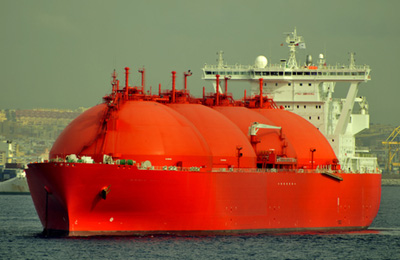
US ban on LNG exports would violate WTO rules
Washington, February 1, 2013
The US would violate global trade rules and damage its credibility if it decides to subsidize steel, chemical and other manufacturers by restricting exports of liquefied natural gas, after years of pressing other countries like China to drop restrictions on natural resource exports, experts said.
"It would be hypocritical and contrary to WTO rules for the United States to impose restraints on the export of LNG while permitting unfettered domestic consumption of natural gas," said Gary Hufbauer, a senior fellow at the Peterson Institute for International Economics, who recently wrote about the issue for the think tank.
The U.S. Department of Energy is considering more than a dozen applications to export LNG as a result of breakthroughs in drilling technology that have dramatically increased U.S. oil and gas production.
That has triggered a fierce debate within the business community, with industrial users like Dow Chemical and Nucor that have benefited from lower natural gas prices arguing against more exports.
Other business groups like the National Foreign Trade Council and the Emergency Committee for American Trade are pushing for a liberal export policy, fearing U.S. restrictions could come back to haunt American firms.
Environmental groups also worry that the new drilling techniques could contaminate water supplies and lead to more greenhouse gas emissions that are blamed for climate change.
Hufbauer said he expected the Energy Department to decide in favor of more LNG exports but proceed slowly with approval of individual projects to monitor the environmental impact.
Price concerns raised by domestic natural gas users are unlikely to carry the day because "it is so contrary to what the United States has been arguing against other countries. I think there would be strong forces in the U.S. government pushing back against that," Hufbauer said.
FREE TRADE EXCEPTION
The United States generally does not restrict exports to give domestic companies a price advantage, or subsidy, and typically objects when other countries impose export bans.
In the case of LNG, the issue is before the Energy Department because a 1938 law requires it to decide whether natural gas exports are in the U.S. public interest.
Congress amended the law in 1992 to allow natural gas exports to countries that have a free trade agreement with the United States. That list has grown to 20 including Canada, South Korea and Australia.
On Thursday, a bipartisan group of senators introduced legislation that would also allow natural gas exports to the 27 nations of the European Union, Japan and other allies.
"This will expand economic opportunities across America and help lower our nation's trade deficit. Our bill will also promote the energy security of key U.S. allies by helping reduce their dependence on oil and gas from countries, such as Russia and Iran," Wyoming Senator John Barrasso said.
As recently as 2007, the United States was making plans to expand imports of natural gas, so the issue of U.S. export restrictions was not a serious concern.
But Jim Bacchus, a former WTO appellate judge now in private practice at Greenberg Traurig, an international law firm, said he felt certain U.S. export curbs would be found in violation of the WTO if challenged by another country.
"One of the biggest recent WTO cases was one that the U.S. brought against China's quantitative restrictions on exports of raw materials. The United States won that case on the basis of Article XI of the GATT," Bacchus said.
'BLUNT TRADE MEASURES'
In that dispute, the United States argued that China's restrictions on exports of raw materials used to make steel and other industrial products gave Chinese producers an unfair advantage by depressing domestic prices for those goods.
"These export restraints are blunt trade measures that are, by China's own admission ... inconsistent with WTO rules," U.S. trade lawyers said in oral arguments in that case.
The United States is making the same point in a case that it has brought with the European Union and Japan against Chinese restrictions on exports of rare earth minerals used in a variety of high-technology products.
"The export restrictions can increase supplies in China's domestic market, driving down the prices that Chinese producers would otherwise pay for these same inputs," USTR said in an October 2012 legal brief.
"Not only does this dynamic create tremendous advantages for Chinese producers vis-à-vis non-Chinese producers, but it also places strong pressure on non-Chinese producers to move their operations, technologies and jobs to China," USTR said.
Still, the U.S. Trade Representative's office on Wednesday declined to say whether a Department of Energy decision to curb additional LNG exports would violate WTO rules.
"Generally, the office would not comment on whether a U.S. export measure that has yet to be decided might or might not raise concerns under trade rules," a USTR spokeswoman said.
But in international venues like the Group of 20 leading economies and the Asia-Pacific Economic Cooperation (APEC) forum, the United States has been a driving force in crafting language urging countries not to curb exports.
Reflecting concern that a new round of protectionism could damage the fragile global economy, APEC leaders in October again pledged to refrain "from raising new barriers to investment or to trade in goods and services, imposing new export restrictions, or implementing WTO-inconsistent measures in all areas, including those that stimulate exports." – Reuters







